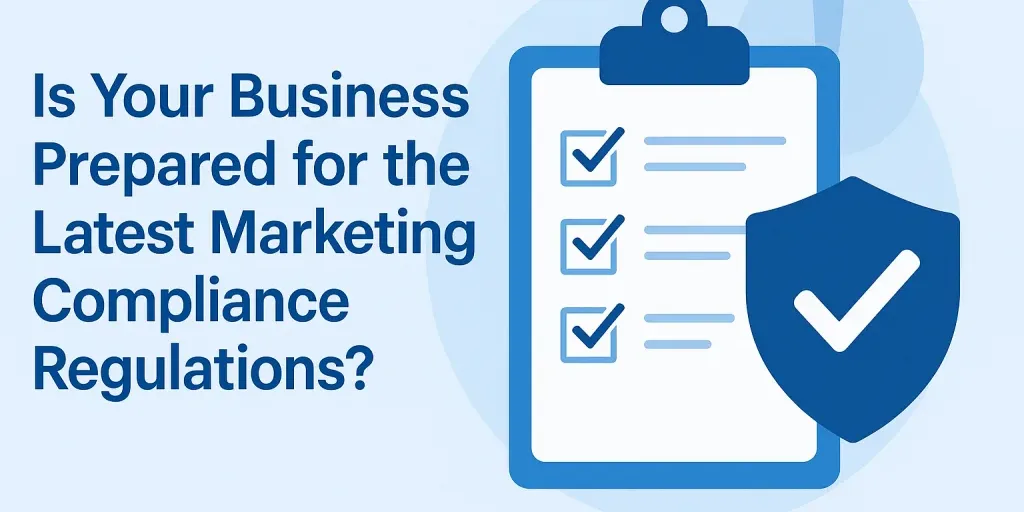

Is Your Business Prepared for the Latest Marketing Compliance Regulations?
Posted May 12, 2025 by Kevin Chern
“Trust is earned in drops and lost in buckets.” — Kevin Plank,CEO Under Armour.
Let’s not sugarcoat it: the regulatory hammer is swinging, and it’s already landed on more than a few high-profile companies.
In 2024 alone, U.S. federal and state agencies issued 12 major enforcement actions tied to marketing compliance and consumer protection. The total? $71 million in penalties (Source: FTC Annual Report, 2024). That’s not noise. That’s a warning siren.
And here’s the kicker—those numbers are just the beginning. Regulators are signaling they’ll double down in 2025, particularly around how companies collect, store, and use customer data in their marketing. The days of sloppy email lists and half-baked privacy policies are over.
What the Rules Actually Say (and Why You Should Care)
Let’s stop pretending this stuff is just “legalese” for the lawyers to deal with. Every CEO, CMO, and growth leader should understand these five cornerstone laws:
1. GDPR (General Data Protection Regulation)
Yes, it’s an EU law—but U.S. businesses with even one EU customer are on the hook. It mandates explicit consent, data transparency, and the right to be forgotten.
2. CCPA (California Consumer Privacy Act)
Not just California’s concern anymore. The CCPA empowers consumers to access, delete, or block the sale of their personal data and other states are rapidly adopting similar laws.
3. COPPA (Children’s Online Privacy Protection Act)
If your marketing targets or even reaches users under 13, whether through games, apps, or educational tools,you’re legally required to obtain verified parental consent before collecting any personal data. Non-compliance isn’t cheap: fines can be severe and start high.
4. CAN-SPAM Act
Email marketing’s rulebook. You’re required to include opt-outs, accurate sender info, and no misleading subject lines. Noncompliance = $50,000+ fines per violation.
5. TCPA (Telephone Consumer Protection Act)
Think texting is a safe alternative? Think again. TCPA requires prior express consent for calls or messages. Violations can cost $500–$1,500 per message.
For a deeper dive, see Navigating Data Privacy Regulations: A Guide for U.S. Businesses.
When Compliance Fails: Reputation, Revenue, and Risk
In Q1 2024, one in five marketing assets reviewed by internal compliance teams were flagged for potential violations (Source: Statista, 2024). Most weren’t malicious—just careless.
Let’s be real. You probably don’t think you’re GoodRx, the U.S. digital health platform that was fined $1.5 million by the FTC for illegally sharing users’ sensitive health data with advertisers like Google and Facebook—without proper consent. But that’s exactly the point.
It wasn’t a rogue marketer or a nefarious data breach. It was a compliance oversight baked into standard operating procedures. And it cost them financially, reputationally, and legally.
If a tech-savvy, regulated company in the healthcare space can make that mistake, any business can. The bar for what counts as “proper consent” has been raised—and most companies are still playing by outdated rules.
See more in The Cost of Non-Compliance: Lessons from High-Profile Cases.
Stop Hoping—Start Auditing: What Proactive Compliance Actually Looks Like
This isn’t a scare tactic. It’s a strategy.
The smartest companies don’t “react” to compliance issues—they prevent them from happening in the first place. Here’s how.
1. Run Quarterly Compliance Audits
Use a structured audit checklist. Review emails, texts, website cookies, social media promotions, and lead gen funnels. Document consent pathways. Confirm opt-out mechanisms. Flag anything that’s vague or outdated.
2. Build Stronger Data Discipline
Treat customer data like a borrowed credit card—handle it with caution. Centralize your data governance. Implement permission layers, audit trails, and clear consumer access mechanisms.
3. Train Everyone, Not Just Legal
Your marketing intern should know what CCPA is. So should your sales team. So should your agency. Schedule regular cross-functional compliance training. Make it part of onboarding.
4. Use Technology (But Don’t Over-Rely on It)
Yes, tech helps. Use platforms like OneTrust, TrustArc, or BigID to track consent, auto-expire data, and generate audit logs. But remember: a tool is only as smart as the person managing it.
5. Appoint a Compliance Lead
This doesn’t have to be a C-suite hire. But someone in your org should wake up every day thinking about privacy, consent, and audit-readiness.
See Key Emerging Trends in Compliance Management for 2025.
The Hidden Upside: Compliance as a Brand Differentiator
Let’s flip the script.
Compliance doesn’t have to be a drag. In fact, it’s one of the last untapped brand levers in a trust-deprived market.
Here’s the data:
- 67% of U.S. consumers want stronger privacy laws (Source: Pew Research, 2024)
- 56% are more loyal to brands that are transparent about data use (Source: Salesforce State of the Connected Customer, 2024)
Imagine turning your privacy policy into a competitive advantage. A clear, concise opt-in page builds more trust than a discount code ever could.
This Isn’t About the Law. It’s About Leadership.
The best leaders know that trust is built long before a transaction—and lost long after the refund clears. Your ability to comply with data laws isn’t just a technical issue. It’s a cultural one. It shows whether you respect your customers enough to protect what matters to them.
Want to be a leader who earns trust in drops—and never loses it in buckets? Start now.

Kevin Chern – CEO – Sanguine Strategic Advisors
After 30 years of building businesses while navigating some of the most complex paths to success, Kevin Chern founded Sanguine Strategic Advisors to lend his insight and experience to other serial entrepreneurs, small business owners and folks in need of a roll-up-your-sleeves innovator, deal maker and doer.
Tags:




